When I first saw the trailer for Joe Wright's film Hanna -- a tale of an adolescent ass-kicker (Saoirse Ronan) who takes on a ruthless adult CIA operative (Cate Blanchett) and her many minions -- I knew I would be plunking down cash for an overpriced ticket on opening night. Do I particularly like action movies? Eh, they serve a somewhat minor purpose for me. In my estimation, Hot Fuzz is the greatest action movie of all time as well as the best (if only) British paean to Bad Boys II and Point Break to date.
But I also like surprises. And upon seeing the Hanna trailer, I thought to myself, "Surprise! The lady hero isn't nekkid! And she's a real character!"
It's not breaking news that Hollywood has consistently struggled to present an action movie heroine whose character range is as flexible as the waistband of her obligatory booty shorts. Not that it hasn't been done before. Remember Linda Hamilton in the Terminator series? Her Sarah Connor was equal parts scared, tough, and empowered. And most importantly, she was what an average woman would look like whilst on the run from an indomitable cyborg. Sans booty shorts.
Therein lies the debate: what "counts" as feminism in a female-driven action movie? It often has less to do with the plot or character and more to do with appearance. A) If she's plain and fully clothed, it's adhering to stereotypes of unattractive, man-hating feminists; B) Being plain and fully clothed is feminist because it shirks cultural expectations of beauty; C) If she's scantily clad and conventionally hot, it's merely serving as eye candy for male viewers; D) If she's scantily clad and conventionally hot, she's merely owning her sexuality and femininity; E) If she's scantily clad, conventionally hot, and kills several men in the process? Feminism!
I'm as personally confused about the line between cinematic images of sexploitation and sexual empowerment as the next person. Nor do I think that there's anything wrong with a fine female form on screen. It's just that definitions of what is fine (and how much of the fineness should be exposed on camera) have become homogenous and a standard for the action movie actress but without requiring character depth. But I do know that while watching the Hanna trailer and later the film, I gave a nod to the writers for finding a loophole in the female action hero conundrum: "Let's make her pre-sexual."
In fact, they weren't the first to do it. Natalie Portman was an assassin's aide in The Professional (though ... the relationship between her and Leon could be construed as ... a bit creepy), and last year Chloe Grace Moretz -- as foul-mouthed Hit Girl -- was pretty much the only reason to see Kick Ass. In an interview Wright spoke on this conscious character choice as well as other films' "alarming" claims at feminism which he believes is just objectification in disguise.
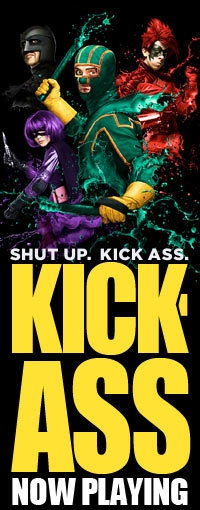
Chloe Grace Moretz (left) as Hit Girl
By taking out the overt sexuality from of Ronan's character -- who is raised by her father in snowy isolation -- we got to focus on Hanna's superior fight skills as well as her loyalty to family, her yearning for friendship, her resentment at not having a childhood, her confusion with modern technology, and her joy at simple pleasures in everyday life. Even her first dalliance into sex -- a near kiss with a hunky Spanish teen -- is made innocent ... until he gets too close and almost gets his neck snapped.
Hanna isn't desexualized per se; there is a simply a re-centering of the focus on her as a female character. Her sexuality (burgeoning or otherwise) is simply one aspect of who she is. And as satisfied as I was with her portrayal (mostly due to how talented Ronan is as an actress), I left the theater with one nagging thought.
Man. Had Hanna been Asian American, it could have been revolutionary.
Just as a feebly comedic aside: Hanna is socially awkward, has encyclopedic knowledge of languages and geography, and her overprotective dad's motto is "Adapt or die." If that's not an Asian American family, I don't know what is.
But really, if there's anything that we need when it comes to Asian American representation in media, it's some damn re-centering.
A young Asian American female who is not marked by hypersexuality, passivity, or deviousness but by fierce strength and actual character development in a non-martial arts movie? We don't have too many role models that fit that criteria, from any age range. Maggie Q is fairly sexed out as a spy in Nikita as was Michelle Yeoh during her stint as a Bond girl. Lucy Liu and her other Charlie's Angels often used their booties to help them solve cases. Liu's O-ren Ishii had some depth in Kill Bill, though that depth was presented to us via anime flashback (cuz she's part Japanese, y'all!). Ishii's sidekick Gogo Yubari, she who donned the school girl's uniform, was crazy good at combat but also just straight up crazy. Kelly Hu was virtually silent as villain Deathstrike in X2. In Sucker Punch, Jamie Chung and Vanessa Hudgens get to battle but in an imaginary brothel world in skimpy costumes. African American, Latino, and other racial/ethnic groups have a similar laundry list of female archetypes that they wish they could finally shake.
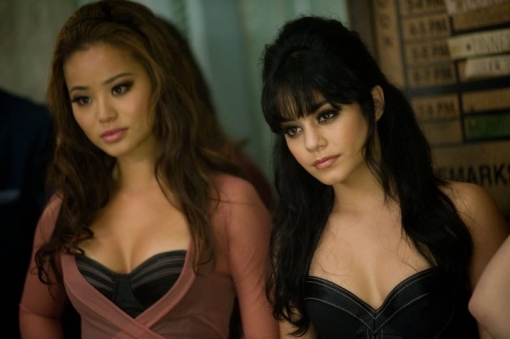
From left: Jamie Chung and Vanessa Hudgens in Sucker Punch
But of course, it comes down to ol' standby issue of access and who is being considered for these more complex, less stereotypical roles. Are studios and mainstream audiences even ready for that complexity when it comes to female characters, let alone female characters of color? In my dream world, Hanna would be used as a model for how we can begin to showcase young female talent without (or maybe more realistically, with less) sexual/racial objectification. The reality is that it may take a series of gradually more nuanced characters to fill out those requisite booty shorts before that happens.
I suppose all actresses must also adapt or die?







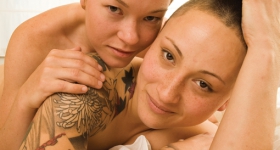
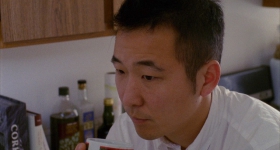
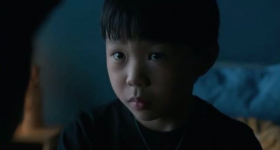
Comments
Hello Fantomex,
I'm not sure how my ode to Hanna was misconstrued as whining, so I feel I should probably clarify. I loved the movie. I loved Saoirse Ronan. I didn't begrudge the film because its lead actress was white; I thought the film was an awesome new representation of an action heroine whose sexuality wasn't the main focus and that it could be used as a model of sorts for female characters of color as well. I don't think I belong in film school; Joe Wright has done the work already and has done it quite well in my opinion.
My "wishing" that Hanna was Asian American wasn't a desire to remove the current star. It was a conjecture on how impactful an Asian American female character in the vein of Hanna might be considering the history of hypersexualized representations of Asian American women in Hollywood.
P.S. I hate whiny bloggers, too.
Hi JR,
Good catch on Ellen Page's character in Inception! Top notch architecture student and the one to figure out that Leo was going cray-cray.
I also loved The Professional, but will probably never get over the charades scene where Matilda is impersonating Madonna with the lace underwear outside her clothes, singing "Like a Virgin."
Sylvie